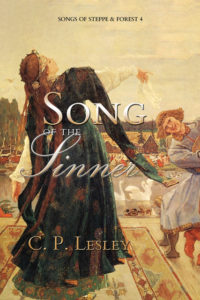 Welcome to Help From My Friends Friday. Today’s guest presents an entirely different conundrum historical authors face when helping their protagonists escape danger. Please welcome, C. P. Lesley and read on! ~ Donnell
Welcome to Help From My Friends Friday. Today’s guest presents an entirely different conundrum historical authors face when helping their protagonists escape danger. Please welcome, C. P. Lesley and read on! ~ Donnell
Mining the Past
By: C. P. Lesley

Author C. P. Lesley
Imagine the following scenario: two sisters decide to leave the big city to spend the summer at their second home. They travel with several children and assorted family members. Along the way, someone attempts to ambush them, then flees before they can ascertain whether the objective was robbery or murder. The sisters don’t recognize the attackers and therefore can’t be sure why they’ve been targeted, although they do have an enemy and suspect him of giving the orders.
So far, we could be looking at an incident from any novel with elements of mystery or suspense. But what happens next depends greatly on when and where the attack takes place. In the modern world, the sisters would call the police from a cellphone, probably even while the assault was underway—unleashing the full panoply of sirens, all points bulletins, computer searches, DNA tests, and police raids. The search might not lead to an arrest in real life, but in a novel readers would experience a dramatic, high-tension chase as the investigation proceeds to its logical conclusion.
As it happens, though, these sisters live in sixteenth-century Russia. They have no police to call and no phones with which to summon them. There are bailiffs who make arrests, but who bears responsibility for supervising a particular stretch of road remains unclear. The local authorities have never heard of fingerprinting, never mind genetic testing or computerized records. And the robbers, having escaped, can vanish into the forests and return to fight another day.
And therein lies the drama, from the perspective of a historical novelist. The technological advances that drive a modern detective or suspense novel certainly have their advantages, especially in real life, but from a fictional perspective at times they make cases almost too easy to solve. Against such detailed information, imagine the possibilities offered by the past, where characters can plausibly flee into the woods and set themselves up as bandit chieftains, disappear for months on end without communicating by e-mail or texting or even through letters, misrepresent themselves as scions of noble or royal houses without being detected, or break into a home or an office without leaving a trace that anyone investigating the crime can detect.
It would be hard to pull off any of these plot points now, yet I’ve used some version of them all in my Legends of the Five Directions and Songs of Steppe & Forest novels. The incident described in my opening paragraph comes from my latest novel, Song of the Sinner, and involves the heroine of that book, Solomonida, and her younger sister Darya, who have left Moscow in the hope of escaping the attention of their bullying cousin Igor, intent on grabbing their property and in general making them pay for daring to thwart his plans for marrying them to suit himself, whether they like his choices or not. Like the trip to the country, Igor’s motivation is timeless: he wants to benefit himself, no matter the cost to others.
version of them all in my Legends of the Five Directions and Songs of Steppe & Forest novels. The incident described in my opening paragraph comes from my latest novel, Song of the Sinner, and involves the heroine of that book, Solomonida, and her younger sister Darya, who have left Moscow in the hope of escaping the attention of their bullying cousin Igor, intent on grabbing their property and in general making them pay for daring to thwart his plans for marrying them to suit himself, whether they like his choices or not. Like the trip to the country, Igor’s motivation is timeless: he wants to benefit himself, no matter the cost to others.
But the means he uses to attain his goals are not those of the modern world, and the counter-measures adopted by Solomonida and Darya are different, too. The attempted ambush fails because they travel with an armed escort, a normal precaution taken by aristocrats at the time, and the escort remains with them to guard their estate against these or any other criminally minded sorts. Igor doesn’t have to worry about surveillance cameras and drones, and his rank protects him even when he’s fingered in a later assault on the hero. But his own inability to read trips him up time after time, as does his tendency to discount potential opposition from women and members of the lower classes, a category that in his mind includes even the highest-ranking civil servants—men (and yes, in those days they were all men) who in our own time would head corporations, excel in the law courts, or resolve international crises.
So if you are writing a story where the only means of stopping your villain is to use the latest bells and whistles, a contemporary saga is the way to go. But if you really want to push your protagonists to the limits, consider taking a time machine into the past. You may be surprised by the vistas that suddenly open before you.
 About the Book:
About the Book:
After surviving marriage to a brute, Solomonida Sheremeteva has sworn never to take another husband. As a boyar’s widow, she at last has the right to choose her own destiny, and she intends to devote her attention to securing a happier future for her daughter. Never mind that she has feelings for a handsome official. His inferior rank means that any association with him can only damage her own child’s prospects.
Anfim Fadeyev could not agree more. He knows as well as Solomonida that a priest’s son should not aspire to the hand of a noblewoman, whatever his achievements in the government and in trade. He needs a mother for his children, not a highborn lover. So when passion overwhelms him and Solomonida one winter’s night, they both face a dilemma: how to respond when the demands of the heart contradict those of the head?
“From Tatar shenanigans on the steppe to the machinations of Moscow’s elite, trained historian C. P. Lesley weaves historical facts with a prodigious imagination and a passion for sixteenth-century Russia. In this novel, she has re-created a world of misogynistic laws, court intrigue, formidable clans competing for power, and women’s camaraderie in the face of male domination.”
—G. P. Gottlieb, author of the Whipped and Sipped Mysteries
About the Author: C.P Lesley is the author of The Not Exactly Scarlet Pimpernel and three series: Tarkei Chronicles, Legends of the Five Directions, and Songs of Steppe & Forest–the last two set in medieval Russia. Her latest novel, Song of the Sinner, appeared in January 2022. Find out more about her and her novels at https://www.cplesley.com
Book and social media links
https://www.fivedirectionspress.com/song-of-the-sinner
https://www.facebook.com/cplesley.authorpage
https://www.instagram.com/authorcplesley
https://www.tiktok.com/@authorcplesley











C.P., I understand that you’re a historian. Are you specialized in Russian history or a certain century. I cannot wait to dig into your book? You brought up an important point in your blog, I often think about. Technology and scientific crime-fighting advances have made it harder to think of innovative ways for my antagonist to get caught. I assure you I am up to the challenge 😉 Thank you for being my guest today!
The idea of solving a crime without today’s technology, and instead relying on shoe-leather and brain cells and a certain amount of luck is the stuff the mysteries I grew up on are made of.
I wish you continued success in bringing these stories to today’s readers.
Such an interesting contrast between solving crimes today and in the past. I have the greatest admiration for CP and others who immerse themselves in the past cultures of other countries in order to bring insights to contemporary readers.
Thanks, all of you. I’m glad you enjoyed my post. Donnell, I specialize in 16th-century Russian history, which is the setting for this series and its predecessor. That’s why I write these novels, in fact: to let people know about this fascinating but unfamiliar time and place in an entertaining way. And thanks so much for letting me guest-post on your blog. It was fun!
My pleasure. I love reading historicals. Better yet, I love learning. Cannot wait to dig into your novels. Must be truly impactful what’s going on in today’s sad world. Thanks, again. C.P.